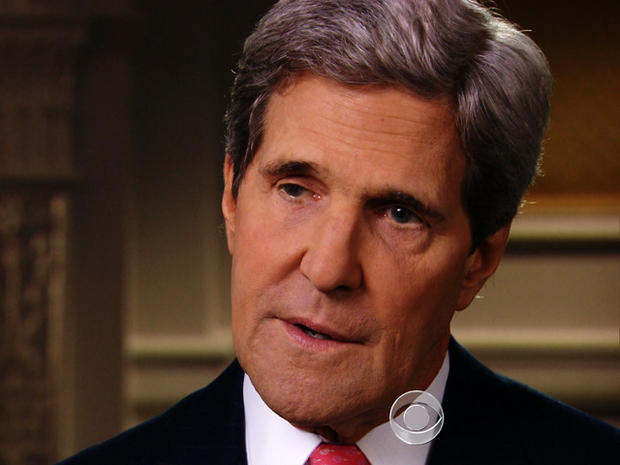Russia agrees to U.N. resolution on Syria chemical weapons
(CBS News) NEW YORK -- There are major developments on two crises that threaten to drag the United States into war. A deal has just been struck to head off an American airstrike against Syria. And there is a big step forward in talks on Iran's nuclear program. Both were happening late Thursday at the United Nations, and Secretary of State John Kerry is in the middle of it all.
Kerry sat down with us Thursday for an interview for "60 Minutes." He revealed the United States would remove the major stumbling block holding up a deal on Syria's chemical weapons. The U.S. had wanted to put teeth in the deal with a threat of military force, something which Syria's ally, Russia, refused to allow.
SCOTT PELLEY: So, with regard to getting a deal in the Security Council, the United States is not going to insist on an explicit use of force.
SECRETARY OF STATE JOHN KERRY: That's correct. We have not taken the threat of it off the table, but it is not part of the actual resolution or this particular negotiation.
PELLEY: But is this idea of the use of force credible anymore? After the enormous opposition you saw from the Congress and from the American people, no one believes that the president would go ahead and use force in Syria.
Watch: Charlie Rose interviews Syria's President Bashar Assad, below.
KERRY: Well, but that was before you had the U.N. report. It was before you had the agreement in-- in Geneva. That was before you had Syria owning up to its weapons and before you had Syria signing up to agree to live by a certain standard. So if Syria doesn't live by that standard, I can assure you this President of the United States is not going to take off the table unilaterally an prerogative that a commander-in-chief has.
Thursday evening, Russia agreed, and now the deal to force Syria to give up its chemical arsenal will go to the United Nations Security Council, where passage is expected. The resolution is punishment for the Syrian dictatorship's use of nerve gas to kill rebellious citizens in August.
In the other major development, Secretary Kerry told us the United States is "grateful" to Iran for its sudden willingness to negotiate over its nuclear program. And late today, Iran's foreign minister said world powers have agreed to fast-track those talks. Iran has been suffering under severe economic sanctions because of its nuclear ambitions. Kerry was specific about what the United States wants to see to make sure the Iranians are not building a bomb.
PELLEY: Give me an example, one concrete step, one thing that they can do to assure the world that they're giving up their ambitions.
KERRY: They could immediately open up the inspection of the Fordo facility -- a secret facility and underground in the mountains, fortified and unquestionably not something that a peaceful program would be doing. They could immediately sign the protocols, the additional protocols of the international community regarding inspections. They could offer to cease voluntarily to take enrichment above a certain level, keep it at a very low level, because there's no need to have it at a higher level for a peaceful program. There are any number of things they could do, Scott.
Watch: Iranian president says Iran must be able to assert its legal rights on nukes, below.
PELLEY: What bold step could the United States take right now to answer this apparent opening by the Iranians?
KERRY: Well, providing that the Iranians take concrete steps, I'm confident they would have an expectation that the United States is going to respond by perhaps adjusting the sanctions regime that we have today, by setting up a process that shows them how they can have this peaceful program without disturbing our efforts to-- to make sure that no country is now going to build nuclear weapons.
PELLEY: But the United States would look favorably on relaxing or eliminating the sanctions if the Iranians were serious about abandoning their nuclear weapon.
KERRY: Well, the United States is not going to lift the sanctions until it is clear that a very verifiable, accountable, transparent process is in place, whereby we know exactly what Iran is going to be doing with its program.
Shortly after that interview, Secretary Kerry met with the Iranian foreign minister in the highest-level talks on Iran's nuclear program in 33 years, and they announced Thursday evening that negotiations will continue in Geneva next month.
The rest of our interview with Secretary Kerry will be seen on "60 Minutes" this Sunday.

